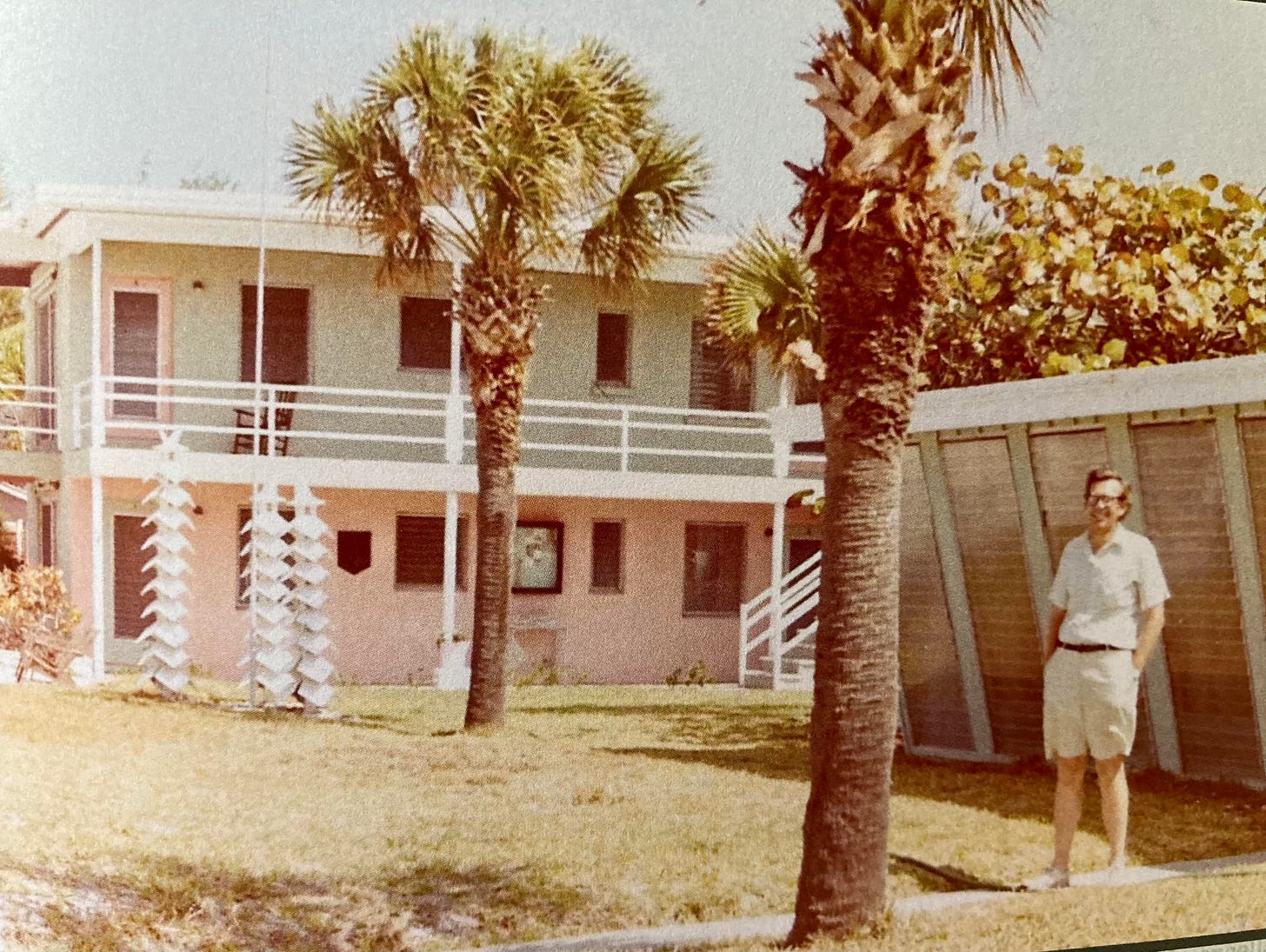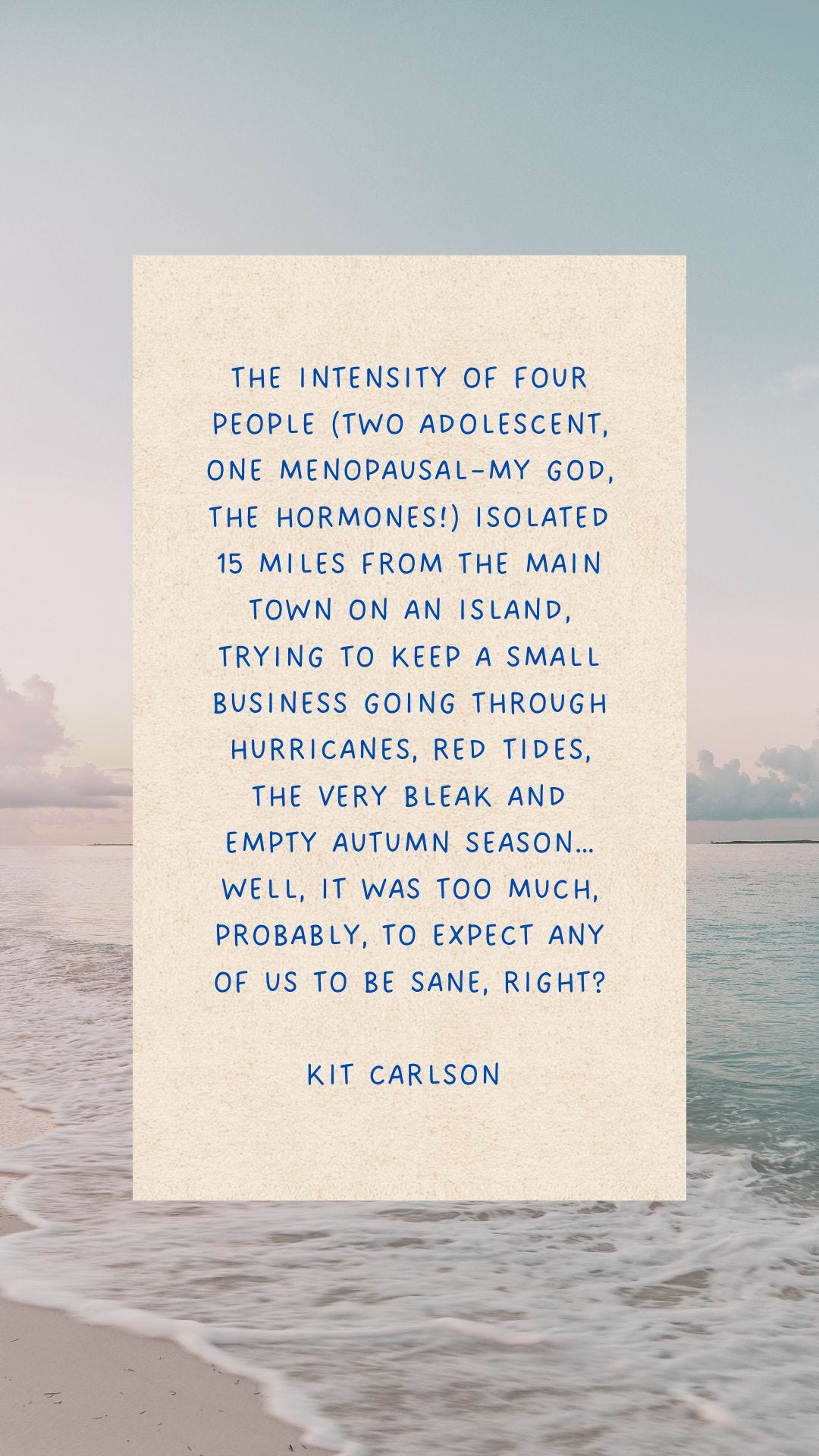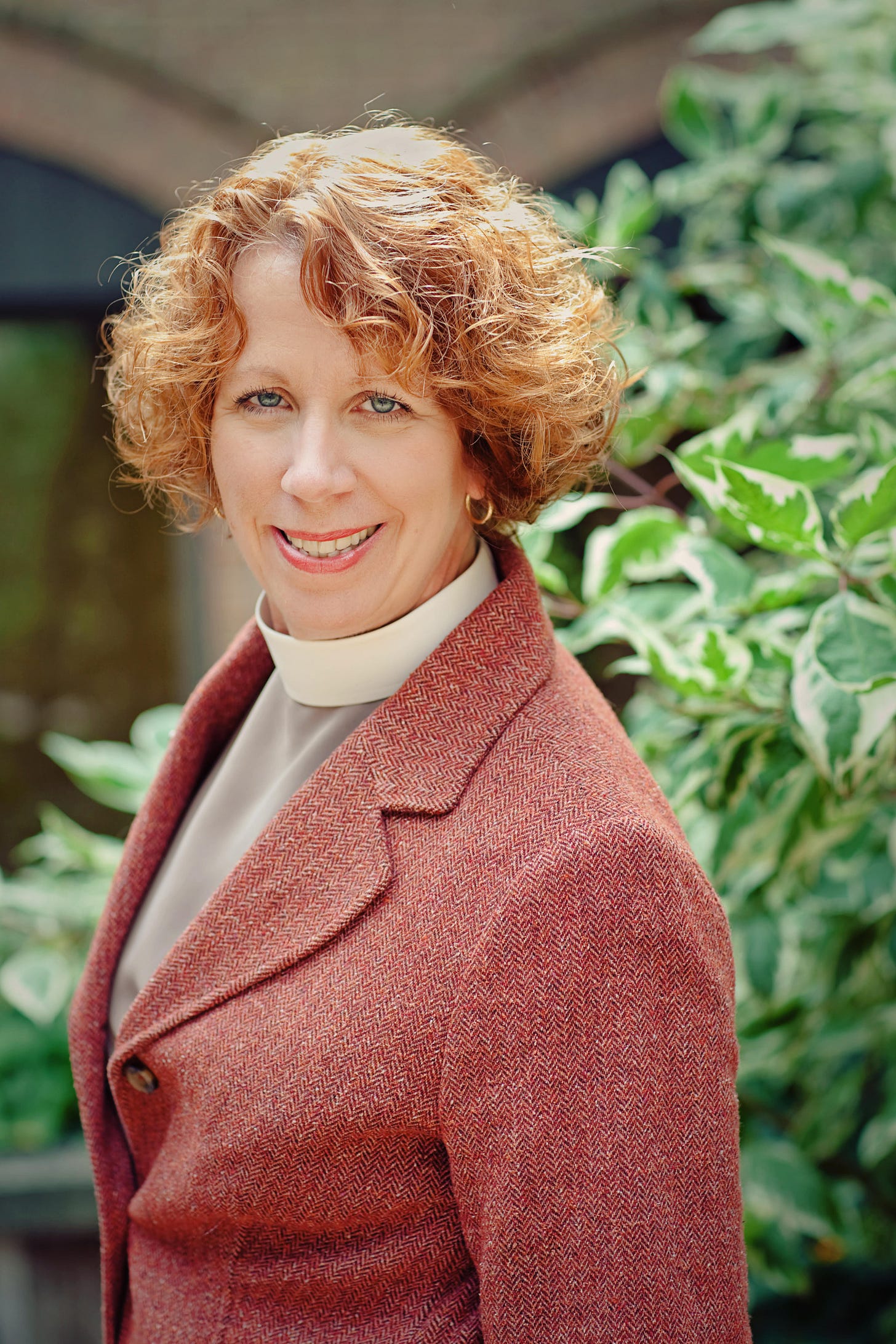Retro, rugged & sunburnt: Kit Carlson on Gulf Tides Motel
What if your parents bought a motel, moved across the country, and dragged you along?
I met Kit Carlson at the Kenyon Writers Workshop a couple summers ago when we were in the same creative nonfiction cohort taught by Grace Talusan. Grace asked us to bring a few items to use for writing exercises, one of them being a document or artifact. Kit brought the brochure from Gulf Tides, a Florida motel her parents bought in the ‘70s.

I was impressed by Kit’s generous spirit and quick wit. Her seamless ability to weave humor and serious topics into her writing was impressive. She also had a magnetic “podium presence” when she read her work aloud. As a (now retired) pastor, Kit knows how to command an audience. In the week we spent together, I learned a great deal from her.
But we didn’t get to discuss her family’s motel much. So when I decided to launch this series featuring writers and their childhood homes, Kit was the first person I reached out to.
Describe your childhood home in three words
Retro, rugged, sunburnt.
What did it look like?
The house was a cypress-sided, flat-roofed, one-story beach house next to a two-story, concrete, L-shaped, 10-unit motel on the Gulf of Mexico. When we bought the house, my parents turned one of the two bedrooms into the motel office, and turned the carport into a bedroom for my sister and me to share, just off the galley-style kitchen.
The house was low and dark inside. A long Florida room ran the length of the house on the beach side. Its wall slanted inward and was covered with leaky jalousie windows. That was where the light and vista was. Otherwise, the house seemed cut off from the sea.
We all shared one bathroom-–it had been a Jack and Jill bath between the two bedrooms, but now provided a cut-through between the office and my parents’ bedroom. It had a toilet, sink and small shower that closed with a folding plastic screen, instead of a proper shower door.
My sister’s and my shared bedroom had one window at each end. My sister’s side faced out onto the highway. My side faced the beach, but the view of the water was blocked by a huge sea grape tree with thick flat leaves that rattled in the wind.
What was your family situation like when you lived there?
From 1971 to 1976, my family owned the Gulf Tides motel on Longboat Key, on the Gulf of Mexico near Sarasota, Florida. I was almost 12 when we moved there, halfway through 7th grade, and I was 17 when I left for college. They sold the motel and moved into town before I came home for Christmas in my freshman year. So my entire adolescence was spent living at a motel, at a small family business that never really made enough money to support our family, and in a situation that created high levels of stress and dysfunction among the four of us.
When we moved there in January of 1971, my older sister had just gotten married, and she remained in Michigan. So it was my parents, my younger sister and me. My parents had lived a typical suburban life in Michigan–my father commuting around Detroit to his job as a hydraulic marketing engineer, and my mother home as a housewife, then, when we got older, she became Director of Nursing at the old folks’ home across the street from our house. Neither of my parents had any experience running a small business, and I don’t think they really understood what they were getting into. They just wanted to get away from Michigan and the long winters there.
At the time of the move, my mother was 50, my father 45, I was 12 and my sister 10. I make a joke that “we put the nuke in nuclear family,” but it is not funny, really. The intensity of four people (two adolescent, one menopausal–my God, the hormones!) isolated 15 miles from the main town on an island, trying to keep a small business going through hurricanes, red tides, the very bleak and empty autumn season…well, it was too much, probably, to expect any of us to be sane, right?
What is your earliest memory inside or around the house?
Scraping the wallpaper from the bedroom that would become the motel office. It had been the bedroom of the previous owners’ son, and it had a Cowboys and Indians theme.
Later, that son would be my social studies teacher, and I could never quite separate the thought of the boy he had been growing up at that motel from the man who was trying to teach us about separation of powers among the branches of U.S. government.
What is one room or space that remains the most vivid in your memory?
My half of the shared bedroom. We divided the long carport into two almost-rooms with matching dressers and desks placed back to back like a wall between us.. On my side of the room, I taped Lord of the Rings and Narnia posters over the very Seventies yellow and orange poppy-flowered wallpaper. On the back of the door that led to the kitchen, I pasted quotes and pictures that had special meaning for me. When we remodeled that part of the house shortly before I left home for college, I wrote every single one of those quotes into a book, which I still keep.
What’s one object from your childhood home that you wish you still had?
My mom hung a two-person rattan swing in the Florida room. It was a place to read, to talk with my best friend, and later, to make out with my boyfriend. I have many good memories of that swing!
How did living in that home influence who you are today?
The entire five-year experience of living on the beach, at the Gulf Tides motel, with my parents and sister, 15 miles from town and school and church and anyone my own age, during all the years between elementary school and college, was a profound crucible that formed me and also damaged me.
My parents’ relationship was a volatile one – I think they thought the drama was romantic or passionate – but my father could be dangerous when he was angry and once he broke my mother’s arm during one of their fights. To escape that intensity, I turned inward—dreaming and writing. I even wrote a three-volume romantic fantasy novel.
I also turned toward God. Youth group and choir at our church in Sarasota provided me with the friends I had longed for and a deep life of faith that many years later, led me to become an Episcopal priest. But while I can see how the experience at the Gulf Tides formed me into the adult I became, I would never say that it was a good thing in my life, or that I was ever glad we had done it.
Have you ever been back? Why or why not?
I believe in redemption tours. In 2014, my husband and I returned to the Gulf Tides. It is now a time-share resort. The ratty old house has been torn down, and two condo units stand on stilts in the spot where our house used to be. The basic shape of the motel building is the same, although it has been reworked and resized.

We stayed in what had been Unit 6 – a room I used sometimes for sleepovers with my high school friends in the offseason. It looks right out on the Gulf. We enjoyed our week on the beach together, and I decided that one week at the Gulf Tides was the perfect period of time to be there. If only my parents had realized that, too.
Does this home ever show up in your work?
It has taken me a long time to get enough distance to write about the Gulf Tides. I am only now finding narrative pathways into those memories, only now finding ways to shape them into prose that might become more art than therapy.
Any closing thoughts you’d like to share?
I realize that my happiness and my sister’s happiness were not at the top of my parents’ agenda, and that the move to Florida was really all about them and their dreams. We were just dragged along because we were there. I think our parents did care about us, and wanted the best for us, but that was no reason not to do something crazy like buy a motel.
In the 20th century, children’s opinions and wishes did not carry the kind of power that they seem to do today. Back then, adults did adult things for the benefit of adults, and children were just supposed to hurry up and become adults. I left for college at age 17 and married at age 21, and never again lived closer to my parents than a two-day drive. I got the memo. I embraced my adult freedom as soon as I possibly could.
About Kit Carlson
Kit Carlson is an Episcopal priest and a life-long writer with work appearing in publications as diverse as Seventeen Magazine and Anglican Theological Review. She has been nominated for a Pushcart Prize and for Best of Short Fictions, and has recently published in EcoTheo Review, River Teeth, Rooted 2: An Anthology of the Best Arboreal Nonfiction, Wrong Turn Lit, and Burningword Literary Journal, among others. She lives in East Lansing, Michigan, with her husband Wendell, and Lola, a nervous rescue dog. Find her at kitcarlson.org.






